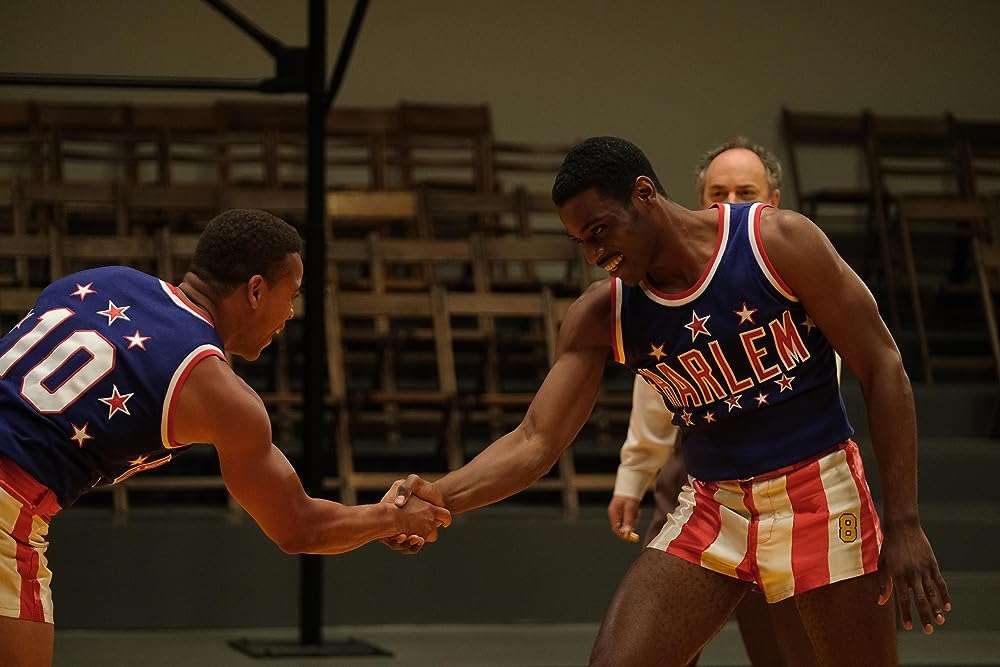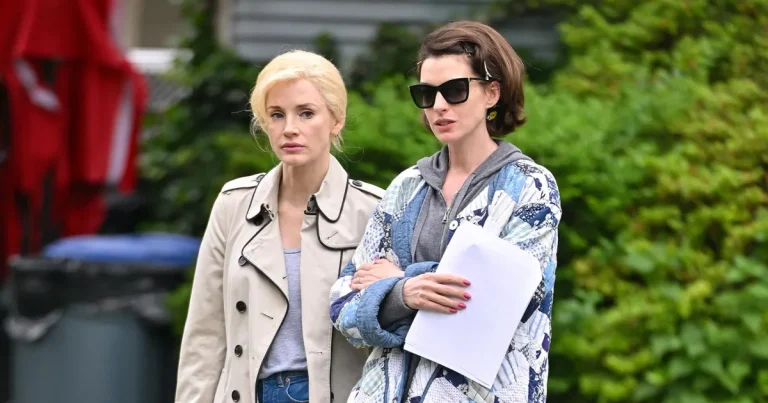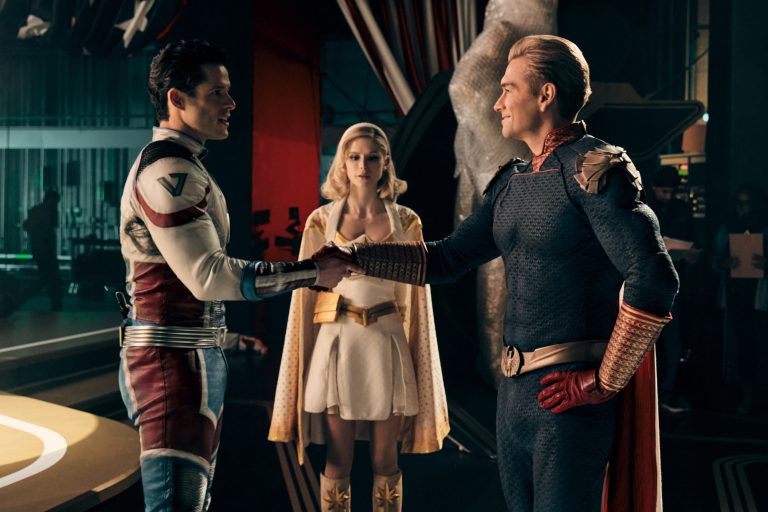Written and directed by Martin Guigui, ‘Sweetwater’ is a sports drama film inspired by true events. The screenplay follows the story of a forgotten star who is responsible for several crucial changes to the way Basketball is currently played. Nat Clifton was one of the first African American players to sign a contract with the NBA (National Basketball Association), who quite literally changed the game for the better. The film follows his journey from being a fantastic yet severely underpaid player to being the main attraction of the game. Besides Everett Osborne as Clifton, the film stars Cary Elwes, Jeremy Piven, Richard Dreyfuss, Kevin Pollak, Eric Roberts, and Jim Caivezel in the central roles.
*Spoilers Ahead*
Sweetwater (2023) True Story Explained: Is Sweetwater based on a true story?
Yes. Everett Osborne starrer Sweetwater is based on a true story. It follows the story of Nat Clifton, famously known as ‘Sweetwater,’ who got roped in the New York Knicks team. Through this inclusion, he became one of the first African American players to play in this Basketball league. His inclusion also led to revolutionizing the sport for the better. In his first season, he led the Knicks to their first appearance in the NBA finals. He played 8 seasons in the NBA and was an all-star. In 2014, decades after his retirement, he was inducted into the Basketball Hall of Fame.
If Sweetwater had not been there, we might have never seen the likes of Michael Jordan, LeBron James, Kareem Abdul-Jbbar, Kobe Bryant, or any other star player belonging to people of color that we now know to be the best there have ever been. Unfortunately, Clifton’s future was not as glittery as the other stars. After retiring from the NBA in 1958, he lived out the rest of his life driving a taxi cab in Chicago.
Sweetwater (2023) Plot Summary & Movie Synopsis:
What is ‘Sweetwater’ about?
Sweetwater is about Nat ‘Sweetwater’ Clifton (Everett Osborne), who is one of the key figures who paved the way for African American players to be a part of the NBA. The film begins with a dialogue between a sports writer (Jim Caviezel) and Sweetwater. He gets in Clifton’s cab and talks about his profession. Hearing Clifton’s interest in basketball, he asks for his knowledge of the history of this game. So, Clifton recounts his time in the Harlem Globetrotters team, where he was the main attraction. Their owner and coach, Abe Saperstein (Kevin Pollak), took pride in his team filled with African American players.
The coach of the New York Knicks (Knickerbockers), Joe Lapchick (Jeremy Piven), witnessed Clifton marking a victory over the Lakers. Later, he met Clifton in the backroom and offered him a chance to be the first African American player to play for their team. Clifton understood the cultural implications and, thus, did not entertain this request. In the New York NBA office, middle-aged white men argued how the league would never include colored folks. They considered it a ‘violation’ of the rules and reiterated that the NBA is for just the white players.
Racism faced by Sweetwater
Ned Irish (Cary Elwes), the president of the Knicks, conveyed the board’s decision to Lapchick, who could not get over Sweetwater’s outstanding game. Besides this incident, the script introduces a few other scenes to convey the blatant racism that Sweetwater faced. At a gas station, a white man stopped Clifton from holding the pump. Moments later, after learning about Clifton’s stardom, the same man asked for his autograph. Later on, a motel manager refused to let the black players stay as per the orders of the owner. Back at Lapchick’s house, he taught his young son not to be racist as his classmates.

Despite Ned’s opposition, Lapchick pursued his decision to showcase the talents of Clifton to a wider public. He knew that the Trotters brought the audience to the stadium more than the white players. So, he decided to use this fame as a way to legitimize their worth. Once these players were brought back to the Garden, Ned spoke with Clifton in person. Clifton revealed how they got paid way lesser than their white counterparts, even though they had superior skills. Despite Lapchick’s interest in poaching Clifton, Saperstein refuses to let him leave. Clifton also understood the pressure of being the first black player in their league. During these conflicting times, he came across a singer with a heavenly voice – Jeanne Staples (Emmaline), and fell for her.
Lapchick & Sweetwater
Over time, Lapchick convinced Ned to bring Sweetwater to their team. Ned realized the implications of breaking a rule, but Lapchick firmly supported this decision. So eventually, Ned met Saperstein and asked for a price to get Sweetwater on their team. Saperstein denied the heavy pay to let this talented Trotter go away. The Trotters, once again, won a game that defied some rules that were hitherto established. Sadly, despite their amazing game, the white players got paid significantly more than them. Sweetwater voiced his opposition loud and clear. Right after, Lapchick and Ned managed to convince Saperstein to send Clifton to be part of the Knicks.
Even after that successful contract, Ned, Lapchick, and Sweetwater suffered many conflicts. While they managed to convince others not to be racist in their decision-making, many white folks remained furious about this inclusion. Two white men beat Sweetwater outside a bar since he refused their offer. Ned also got a beating by a racially-motivated angry bloke. Nevertheless, Sweetwater used his skills to be an integral part of the Knicks. Around this time, another black player – Earl Lloyd, got roped in to play for the Capitals. It disappointed Ned, who wanted to be a pioneer of this inclusionary revolution.
In 1950, at Madison Square Garden, Clifton played his first-ever game as an NBA player. His entry received a standing ovation and a round of applause. When Clifton scored a goal, the referee called it ‘a travel. It marked the beginning of bad luck for Sweetwater, who kept getting a foul after another. Lapchick argued against this referee who called anything foul because he had not seen it before. But his attempts did not help. Meanwhile, the Olympians kept scoring more and more.
Sweetwater (2023) Movie Ending Explained:
During the intermission of the Knicks’ 1950 against the Olympians, Lapchick told Sweetwater to play by the pre-established rules. Clifton argued that his idea of revolutionizing the game is also about the way it is played. But Lapchick wanted Clifton not to lose the one chance he had to prove his incredible worth. At that moment, Clifton remembered a time when his old coach spoke with him. He pointed out how Clifton would need to continue playing according to the white folks’ rules and not try to change them. After going down memory lane, Sweetwater changed the course of the team’s game against the Olympians. The Olympians lost in the game’s final moments, whereas Sweetwater stole this chance to rise victorious.
While the film has its intentions at the right place, it is marred by a generic screenplay that does not dig enough into the intricacies of this play. The white folks, who wanted to appear revolutionary and non-racist, did so mostly because Sweetwater sold more tickets, or Trotters did. But this aspect of fame or money is rarely discussed besides a grumpy white man saying, ‘ Basketball is business.’ The film showcased how Sweetwater rose to fame and his struggles before that. But it hardly sheds light on why it did not change his life overnight. There was so much ground to cover, but besides Osborne’s performance, the film does not have not much to offer to make it memorable.



![Oxygen [2021] Netflix Review – Taut single-location thriller serves as an allegory for socially-distanced isolation](https://79468c92.delivery.rocketcdn.me/wp-content/uploads/2021/05/O2_20200728_Unit_01993_R2-768x513.jpg)




